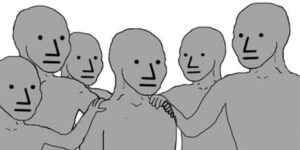
Introduction to Democratic Socialism
A recent PEW research poll revealed that 69% of American voters under the age of 30 are willing to vote for a socialist president for the United States. After knowing this then, the popularity of those with the likes of Bernie Sanders and Alexandria Ocasio-Cortez is no shock. These self-proclaimed “democratic socialists” get hundreds of thousands if not millions to rally behind them for the cause of free healthcare and education. This relatively new breed of neo-Marxism has an evolved meaning of socialism. Nobel laureate economist F.A. Hayek pointed out in the foreword of the 1976 edition of his world famous book, “The Road to Serfdom”, that socialism has evolved not to mean the public ownership of the means of production (which inevitably means government ownership), but rather material equality of citizens through progressive income taxation and welfare handouts. Immediately, one familiar with Austrian economics and libertarian ethics sees problems with this ideology.
To afford to pay for all that the democratic socialists promise, there needs to be a relatively high income tax (at least on those who are the most productive in society). There are other methods of paying for public spending, but a progressive income tax is always there. Other methods consist of printing off more money to spend, which leads to inflation due to the impossibility of simply printing wealth, and of course, taking on a national debt to be payed off later to allow for present spending. These methods are just respective indirect and future taxes. A third of the average American’s income goes to taxes, meaning that from the start of the new year until the end of April, he is working for nothing. As per the broken window fallacy, every dollar taxed is a dollar less spent, reducing economic growth and prosperity. This has another effect on large firms, as by being taxed at a high rate makes it far more difficult to offset losses with profits, leading to bankruptcy and further damaging the economy.
Of course, many will say that taxation is the “price we pay for a civilized society”, which is ironic, as there is nothing civilized about using force to steal an innocent populace’s wealth and, to make matters worse for those who use this argument, all wars and foreign intervention as well as the war on drugs and its subsequent mass incarceration is payed for by the income tax. The United States, for the better parts of the late 18th and the 19th centuries, had no income tax, but instead had just a tariff. Unfortunately, government’s appetites for spending and growing is endless and the current size and economic fascism of the United States is no surprise.
Many fall into this idealistic trap by thinking a system of free enterprise is exploitative and that every transaction helps one side (the rich) while harming the other (the poor). This is called the zero-sum fallacy, the belief that wealth is a fixed number and someone getting richer must mean someone else getting poorer. They don’t realize that there is no set amount of wealth, and that to sell something for a profit, businesses must produce a good or a service, which increases the available pool of wealth. No one gets poorer; both parties, in fact, get richer. However, when the government gets involved with these transactions, it brings with it more terms and conditions, so to speak, that each member must agree to for the transaction to take place. More terms will ensure they are met by the two parties less often, decreasing transactions and therefore, wealth production.
Their breed of socialism suffers mainly from 2 economic problems: incentive and knowledge. If socialism does achieve equality by taxing those who make more and providing welfare to those who don’t to make them equal, why would anyone work hard and/or bad jobs? Why go become an engineer if a food tester makes the same? Why bother putting in endless hours to perfect a craft rather than do a half-assed job? That’s what the settlers did in early America. They had a socialistic mutual ownership of land and property. Within six months, only 38 of the 104 survived. Two years later, when 500 new settlers came, 440 of them died too. The problem was said to be a “lack of effort, not resources”. In 1650, farms have essentially been privatized and the problem was solved. The economy in 1776 was roughly 100 times larger. Socialist want to change human nature so that self-interest, laziness and greed are over powered by a person’s altruism. This will never happen because contrary to what communists and social justice warriors alike believe, humans when born are not blank slates.
When socialists do plan nationalized industries, they don’t bother optimizing for maximum efficiency, as they don’t rely on profits and efficiency to have a source of income. Unfortunately it gets worse, as the bureaucrats literally can’t optimize their planning, even if they wanted to. They simply don’t have the knowledge required. In a market economy, each industry’s many firms find the best ways to make their products. They figure out the demand for their product or service as well as the best way to optimize efficiency which in turn lowers production costs and therefore the prices. Economic efficiency is a bottom-up phenomenon, not a central top-down plan.
Socialist intellectuals, however, don’t seem to care about what economic science has to say about their theories. Economic logic and freedom are not what they value, but they instead have a dogmatic lust for the idea of utopian egalitarianism. As long as their system is combating inequality, which most of the time leads to the handicapping of the successful, in the form of progressive income tax, affirmative action and heavy regulation, then everything’s fine. They go so far as to find every fault within a capitalist system while making every excuse for communism. They often don’t even care if the policies they support even work so long as they have the intention to work. One such example is regulation: they think regulations are good because they help keep people safe from the oh-so-evil corporations, and that they help fight against big business monopolies to maintain equality. It doesn’t matter that as per “capture theory of regulation” of the Chicagoan economists, most regulators of an industry are the leaders of that very industry and that their regulations bankrupt smaller firms and deter others from entering the field.
Of course, socialism has always been the fetish of elite intellectuals, so much so that it is even inaccurate to call it a worker’s movement. The theories and utopian ideals are thought up by the intellectual class, which then get spread to the masses via journalists, TV personalities, radio commentators, authors, teachers and preachers. It is assumed that these so-called intellectuals despise a libertarian society as they are rendered useless as social and economic planners. Or, they’re simply jealous, for they think they deserve to be rich and famous for being intellectuals, while they get completely financially outmatched by fiction writers, movie stars and singers, occupations they believe is below them and are able to turn this hatred and envy into an entire political philosophy and economic system.
Finally, its appropriate to end by stating economist Thomas DiLorenzo’s 4 laws of government:
1st Law: Public sector failure leads to a higher budget.
2nd Law: Politicians never accept responsibility and always blame capitalism.
3rd Law: Media lapdogs go along with the lies of politicians.
4th Law: Politicians only ever listen to academic advice granted the advice is pro increasing size and scope of government.




